MAKING
PEACE WITH
THE THINGS IN
YOUR LIFE
MAKING
PEACE WITH
THE THINGS IN
YOUR LIFE
WHY YOUR PAPERS, BOOKS, CLOTHES,
AND OTHER POSSESSIONS KEEP OVERWHELMING YOU
AND WHAT TO DO ABOUT IT
CINDY GLOVINSKY, M.S.W., A.C.S.W.
 ST. MARTINS GRIFFIN
ST. MARTINS GRIFFIN  NEW YORK
NEW YORK
MAKING PEACE WITH THE THINGS IN YOUR LIFE . Copyright 2002 by Cindy Glovinsky, M.S.W, A.C.S.W All rights reserved. Printed in the United States of America. No part of this book may be used or reproduced in any manner whatsoever without written permission except in the case of brief quotations embodied in critical articles or reviews. For information, address St. Martins Press, 175 Fifth Avenue, New York, N.Y. 10010.
www.stmartins.com
Book design by Gretchen Achilles
Library of Congress Cataloging-in-Publication Data
Glovinsky, Cindy
Making peace with the things in your life : why your papers, books, clothes, and other possessions keep overwhelming you and what to do about it / Cindy Glovinsky.
p. cm.
Includes bibliographical references and index.
ISBN 0-312-28488-8
1. Conduct of life. I. Title.
BF637.C5 G57 2002
158.1dc21
2001059870
TO EVERYONE WHO HAS EVER LIVED WITH ME
AND SURVIVED BOTH MY OWN BATTLES WITH THINGS
AND MY JOURNEY TO PEACE
CONTENTS
PART I
RETHINKING THINGS
PART II
YOU AND YOUR THINGS: TAKING INVENTORY
PART III
WHY THINGS KEEP OVERWHELMING YOU
PART IV
WHAT TO DO ABOUT THINGS
ACKNOWLEDGMENTS
T his book was, in many ways, a collaborative effort, and I want to thank all those who helped make it happen. Three wise, generous women deserve special recognition. Judith Kolberg founded the National Study Group on Chronic Disorganization, a group that has influenced my thinking in countless ways, while Judith herself read the manuscript through twice and provided insightful comments both times. Sari Solden, my therapy supervisor and mentor, stimulated ideas through supportive discussion and gave helpful feedback on several drafts of the manuscript. Parang Geri Larkin fostered both my organizing and my spiritual careers personally as well as through her Building a Business workshops and, in addition, connected me with her superb agent, who is now also mine.
Two other people played key roles early on. Jim Reisinger, president of the ADDult Information Exchange Network, offered me the opportunity to give workshops at several of their conferences, in preparation for which I developed many of the ideas presented here. Pam Letterman invited me to cofacilitate a support group for ADD adults, and other ideas originated within the context of this wonderful group, which met during the time I was writing the first draft.
Numerous others read the manuscript, gave suggestions, and helped with the editing, including Phyllis Perry, Ruth Greenwood, Mary McKinney, Roger Lauer, Denslow Brown, Seth Warschausky Terry Matlen, Sallie Foley, Emily Jernberg, Karen Mikus, Irene Tobis, Marilyn Churchill, Ann Saunders, Sara Bassett, Matthew Ferguson, Betty Housh, and Ira Glovinsky. These individuals comments were absolutely vital to the quality of the final draft.
I am grateful to Andrea Pedolsky of Altair Literary Agency for believing in this project, for helping me to improve the proposal, for finding me a first-rate editor and publisher, and for her constant availability and support. Andreas unswerving good sense has helped me to stay focused through good times and bad.
Thanks also to my two editors at St. Martins Pressto Dorsey Mills for her enthusiastic acceptance of the manuscript and to Marian Lizzi for her thoughtful and thorough editingas well as to other St. Martins staff involved in producing and marketing this book.
Most of all, I appreciate the loving support of my husband, Ira Glovinsky, whose patience during this all-consuming undertaking has never flagged; my son, Matthew Ferguson, whose insightful suggestions provided input from generation X; and my mother, Betty Housh, who taught me most of what I know about organizing.
Finally, thanks to the countless clients who taught me everything I know about the issue of Things and none of whom bears the least resemblance to the characters that appear in this book, being infinitely more complex, multitalented, and the nicest people you would ever want to know.
The world is so full of a number of things,
Im sure we should all be as happy as kings.
ROBERT LOUIS STEVENSON
INTRODUCTION
L iving in perpetual conflict gets old. The conflict between people and Things is nonviolent but relentless. You spend an afternoon sorting through mountains of papers and file them all in special color-coded folders, but within a week, your desk has disappeared again. You devote an entire Saturday to decluttering the family room, haul six loads of Things to the Salvation Army, and in a few months you have to do it over. Meanwhile, you do not write your report, work out, or go to the beach with your family. Or you do, but all the time you are engaged in the activity your thoughts are somewhere else, preoccupied by the armies of Things hovering just beyond the horizon.
You know in your mind that Things are not alive, yet you could swear that they gang up on you. Things seem to crawl through the cracks and breed during the night, stacking themselves up in all the most inconvenient places. Although you may bankrupt yourself buying organizing equipment, hire a professional organizer, read every how-to book on the subject, and spend months scaling your Things down to little or nothing, you can be sure that in the end, like the Blob in the 50s movie, THEY WILL BE BACK.
This is not an illusion, as long as you continue to regard your Things as The Enemy. Perhaps you believe that all you have to do to break the cycle is to conquer your Things, to impose your will on them by putting every last Thing in perfect order. This will not work. What does work is getting honest with yourself. Change begins with the recognition that YOUR THINGS DO NOT DO ANYTHING TO YOU. You or someone else puts the Things where they are.
If you repeatedly put your Things in places that dont work for you, this is mostly because of whats happening on the inside, not the outside. The problem could be denial about the realities of your present situation, neurological glitches, or a full-blown emotional conflict. All three of these obstacles may be combined with the biggest obstacle of all: the shame you may feel about the state of your Things. Shame gums up your thinking processes and makes it impossible to think clearly about what needs to be done. If you want to make peace with the Things in your life, you must first understand and make peace with yourself. There is no other way.
The focus of this book, therefore, is not external but internal. This is not a book about how to sort papers or set up a closet but about what keeps you from sorting or setting up and how to over-come obstacles to success. It is not meant to replace the externally focused organizing books that you may already have but to enable you to make better use of them after rethinking every aspect of you and Things.
My training as a psychotherapistIm both a therapist and an organizing consultanthas taught me that different people may have the same problem for many different reasons. You may have Thing-management problems because youre short on time or space, because of transitions or other people in your life, because you have memory problems, visual processing problems, attention problems, or task completion problems, because youre depressed, ill, grieving, obsessive-compulsive, addicted, or for a host of other reasons. Permanent success in making peace with your Things depends on figuring out EXACTLY what is going on: then you can begin to do something about it.


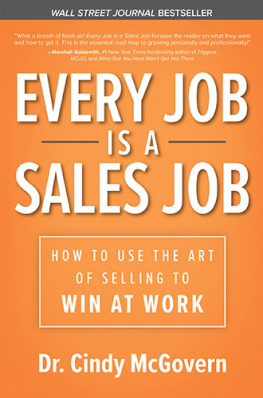
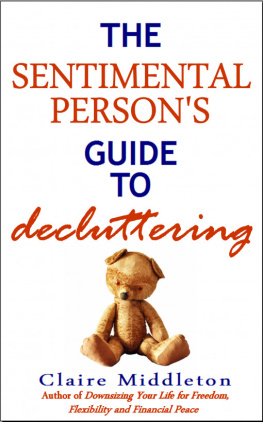
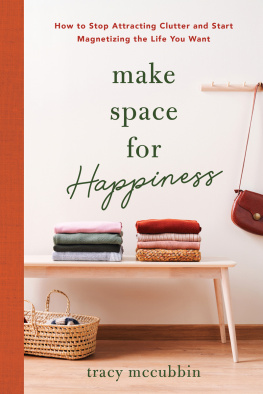
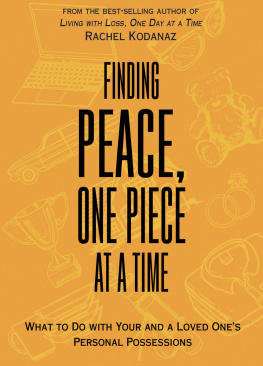
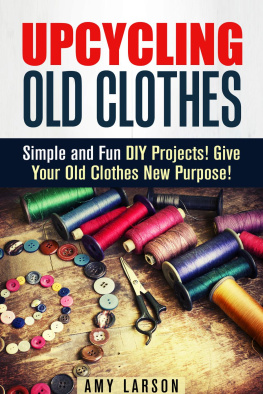
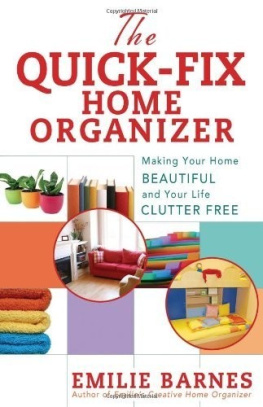
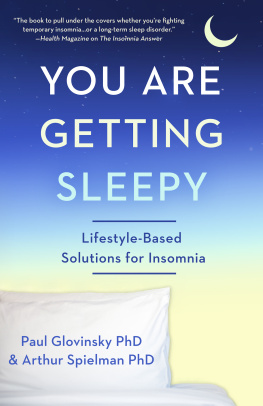
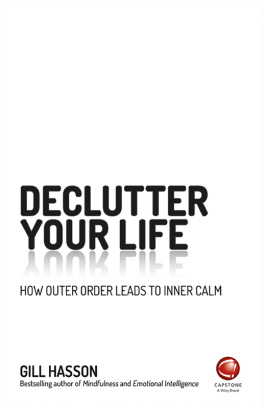
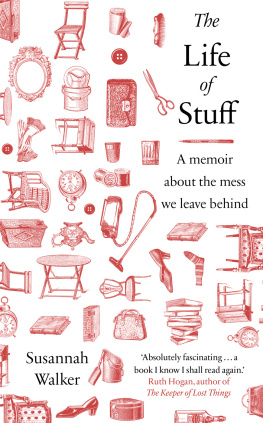
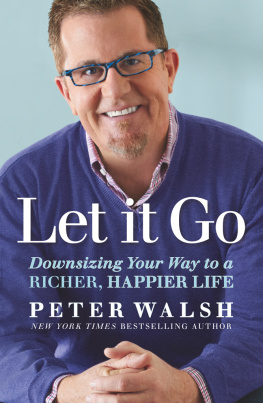
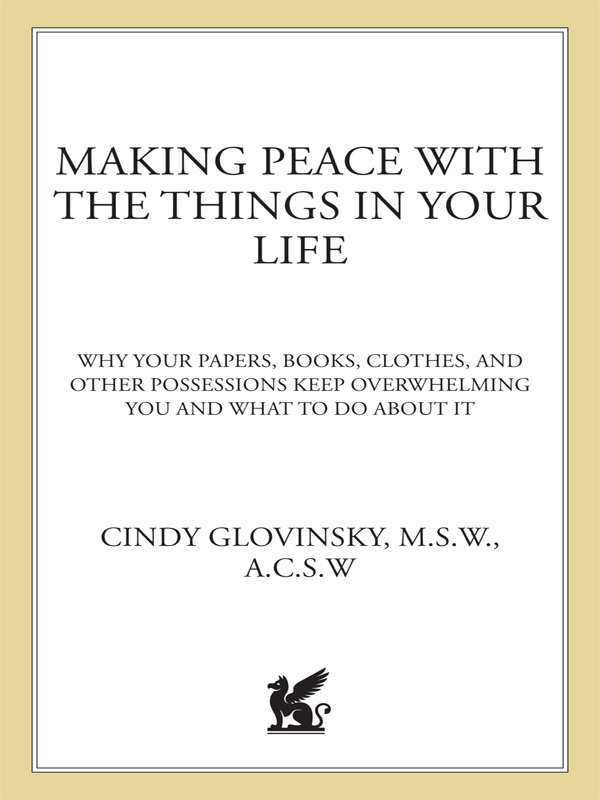
 ST. MARTINS GRIFFIN
ST. MARTINS GRIFFIN  NEW YORK
NEW YORK